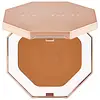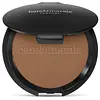What's inside
What's inside
 Key Ingredients
Key Ingredients

 Benefits
Benefits

 Concerns
Concerns

 Ingredients Side-by-side
Ingredients Side-by-side

Synthetic Fluorphlogopite
Talc
AbrasiveMagnesium Myristate
Hdi/Trimethylol Hexyllactone Crosspolymer
Mica
Cosmetic ColorantPolymethyl Methacrylate
Dimethicone
EmollientIsodecyl Neopentanoate
EmollientSilica
AbrasiveTrimethylsiloxysilicate
EmollientTriethoxycaprylylsilane
Polypropylsilsesquioxane
Diisostearyl Malate
EmollientCaprylyl Glycol
EmollientDimethiconol
EmollientPhenoxyethanol
PreservativeOctyldodecyl Stearoyl Stearate
EmollientHexylene Glycol
EmulsifyingLauroyl Lysine
Skin ConditioningTocopheryl Acetate
AntioxidantTocopherol
AntioxidantWater
Skin ConditioningMaltodextrin
AbsorbentCarica Papaya Fruit Extract
Skin ConditioningMangifera Indica Fruit Extract
Skin ConditioningCalcium Sodium Borosilicate
Calcium Aluminum Borosilicate
Xanthan Gum
EmulsifyingEthylhexylglycerin
Skin ConditioningSorbic Acid
PreservativeTin Oxide
AbrasiveCI 77288
Cosmetic ColorantIron Oxides
CI 77742
Cosmetic ColorantCI 77891
Cosmetic ColorantSynthetic Fluorphlogopite, Talc, Magnesium Myristate, Hdi/Trimethylol Hexyllactone Crosspolymer, Mica, Polymethyl Methacrylate, Dimethicone, Isodecyl Neopentanoate, Silica, Trimethylsiloxysilicate, Triethoxycaprylylsilane, Polypropylsilsesquioxane, Diisostearyl Malate, Caprylyl Glycol, Dimethiconol, Phenoxyethanol, Octyldodecyl Stearoyl Stearate, Hexylene Glycol, Lauroyl Lysine, Tocopheryl Acetate, Tocopherol, Water, Maltodextrin, Carica Papaya Fruit Extract, Mangifera Indica Fruit Extract, Calcium Sodium Borosilicate, Calcium Aluminum Borosilicate, Xanthan Gum, Ethylhexylglycerin, Sorbic Acid, Tin Oxide, CI 77288, Iron Oxides, CI 77742, CI 77891
Mica
Cosmetic ColorantOctyldodecyl Stearoyl Stearate
EmollientSilica
AbrasiveBoron Nitride
AbsorbentLauroyl Lysine
Skin ConditioningMagnesium Myristate
Caprylic/Capric Triglyceride
MaskingPolyethylene
AbrasiveWater
Skin ConditioningBis-Stearyl Dimethicone
EmollientIsochrysis Galbana Extract
Skin ConditioningErythrulose
TanningPolyglyceryl-2 Triisostearate
EmulsifyingPalmitoyl Isoleucine
Skin ProtectingPhenoxyethanol
PreservativeTitanium Dioxide
Cosmetic ColorantIron Oxides
CI 77163
Cosmetic ColorantMica, Octyldodecyl Stearoyl Stearate, Silica, Boron Nitride, Lauroyl Lysine, Magnesium Myristate, Caprylic/Capric Triglyceride, Polyethylene, Water, Bis-Stearyl Dimethicone, Isochrysis Galbana Extract, Erythrulose, Polyglyceryl-2 Triisostearate, Palmitoyl Isoleucine, Phenoxyethanol, Titanium Dioxide, Iron Oxides, CI 77163
Ingredients Explained
These ingredients are found in both products.
Ingredients higher up in an ingredient list are typically present in a larger amount.
This ingredient comes from a fatty acid (lauric acid) and amino acid (lysine). It is used to add a silky feel to cosmetics.
According to a manufacturer, its fatty acid base leaves a silky feeling on the skin. It also has emollient properties because of this. Emollients help soften skin by preventing water from evaporating.
Lauroyl lysine is barely soluble in water.
Learn more about Lauroyl LysineWe don't have a description for Magnesium Myristate yet.
Mica is a naturally occurring mineral used to add shimmer and color in cosmetics. It can also help improve the texture of a product or give it an opaque, white/silver color.
Serecite is the name for very fine but ragged grains of mica.
This ingredient is often coated with metal oxides like titanium dioxide. Trace amounts of heavy metals may be found in mica, but these metals are not harmful in our personal products.
Mica has been used since prehistoric times throughout the world. Ancient Egyptian, Indian, Greek, Roman, Aztec, and Chinese civilizations have used mica.
Learn more about MicaOctyldodecyl Stearoyl Stearate is created from stearic acid.
It is an emollient and thickens the lipid (oil) portion of a product. Due to its emollient properties, it may not be fungal-acne safe.
Phenoxyethanol is a preservative that has germicide, antimicrobial, and aromatic properties. Studies show that phenoxyethanol can prevent microbial growth. By itself, it has a scent that is similar to that of a rose.
It's often used in formulations along with Caprylyl Glycol to preserve the shelf life of products.
Silica, also known as silicon dioxide, is a naturally occurring mineral. It is used as a fine, spherical, and porous powder in cosmetics.
Though it has exfoliant properties, the function of silica varies depending on the product.
The unique structure of silica enhances the spreadability and adds smoothness, making it a great texture enhancer.
It is also used as an active carrier, emulsifier, and mattifier due to its ability to absorb excess oil.
In some products, tiny microneedles called spicules are made from silica or hydrolyzed sponge. When you rub them in, they lightly polish away dead skin layers and enhance the penetration of active ingredients.
Learn more about SilicaWater. It's the most common cosmetic ingredient of all. You'll usually see it at the top of ingredient lists, meaning that it makes up the largest part of the product.
So why is it so popular? Water most often acts as a solvent - this means that it helps dissolve other ingredients into the formulation.
You'll also recognize water as that liquid we all need to stay alive. If you see this, drink a glass of water. Stay hydrated!
Learn more about WaterThis ingredient is a combination of red, black, and yellow iron oxide pigments. This combination of colors is usually found in foundation, because it results in a "skin" color.